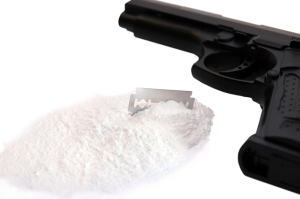Firearm laws are clearly defined and strictly enforced in Massachusetts. Anyone wanting to legally possess or carry a firearm must follow strict protocol and carry a firearm identification card, or FID. While gun violation penalties are serious, they are increasingly severe in the presence a controlled substance. If you find yourself facing charges involving both a firearm and controlled substance, contact a criminal defense attorney right away. This post examines how you might defend yourself against the possession of firearms and narcotics.
What Are the Charges for a Gun Violation?
In Massachusetts, a Class A FID card permits the owner to carry a gun open or concealed, while a Class B license permits open carry. Penalties for a violation start at 18 months in jail and can escalate to five years in state prison. However, it is a separate crime entirely to possess a firearm when under the influence of drugs or alcohol, despite the presence of an FID card. Penalties start at 2 ½ years in state prison and a $5,000 fine. All gun violations are also likely to result in the loss of weapon privileges.
A Chelsea man was recently sentenced to 15 years in prison for a death resulting from an unlawful drug deal gone bad. While the prosecution was unsuccessful in reaching a 2nd-degree murder conviction, he still faces serious jail time for possessing a firearm in the presence of narcotics. In a similar case, a Colchester police detective is facing federal court charges for crimes related to drug distribution and gun trafficking. The detective, Tyler Kinney, was in charge of his department’s evidence storage when a police-commandeered firearm was found during a drug raid, along with an undisclosed amount of drugs.
What Are the Charges for a Drug Violation?
The state of Massachusetts defines a controlled substance as a drug or prescription medication that is dangerous if left unregulated. Controlled substances include heroin, cocaine, certain prescription drugs, and more than an ounce of marijuana. While penalties for possession or distribution depend on the class, they range anywhere from one year to ten years in prison for a first violation. Second and subsequent violations lead to anywhere between 2-15 years in state prison. Most offenders can have their sentence cut in half. However, if a firearm was present during arrest, all options of parole are revoked, forcing those charged to serve a full term.
What Defenses Can I Use in Court?
Consequences for the possession of a controlled substance and a firearm are no laughing matter. However, an experienced criminal attorney can review the circumstances of your case to find evidence that works in your favor. If police officers violated the rules of a warrant in any way prior to your arrest, the case could be thrown out. Or, if your constitutional rights were violated prior to or during arrest, your lawyer can discredit the foundation of the charges against you. An attorney can also cross-examine the arresting officer to cast doubt about whether you truly held possession of the drug at the time of arrest. Or, your attorney can discredit the legality of the initial search.
Massachusetts prosecutors take double possession seriously and will seek the heaviest conviction allowable within the law. For this reason, it is critical that you find experienced criminal attorney to review your case and prepare your best line of defense against these complex charges.
 Massachusetts Criminal Defense Attorney Blog
Massachusetts Criminal Defense Attorney Blog


